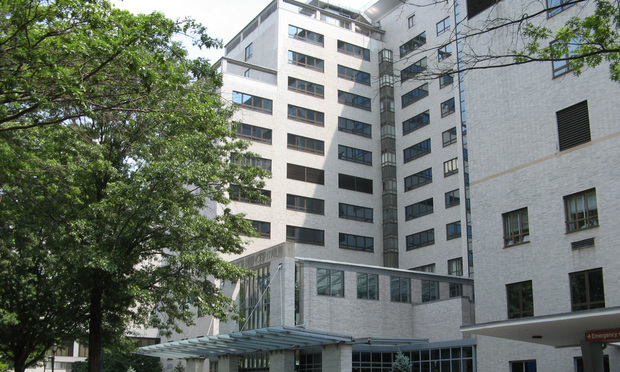Is Companionship Worth $4.5M? Connecticut Supreme Court to Consider 'Loss of Consortium' Claim
The Connecticut Supreme Court will hear oral arguments next week in an appeal by Hartford Hospital related to a medical malpractice verdict. The hospital claims the $4.5 million a jury awarded a widow for loss of consortium was excessive.
April 27, 2018 at 05:44 PM
6 minute read

The Connecticut Supreme Court is set to hear oral arguments May 4 in a case that focuses on how much a widow can collect in a loss of consortium claim.
A jury awarded $4.5 million for the tort that allows a spouse or family member to sue for being deprived of a loved one's physical companionship after an injury.
But the defendant in that case argues the multimillion-dollar award was far too much, taking its case all the way to the high court.
At issue is a $5.8 million January 2017 jury verdict in a medical malpractice claim against Hartford Hospital. The lion's share of that verdict came after the jury found in favor of plaintiff Marjorie Ashmore, and awarded her $4.5 million for her loss of consortium claim in the death of her husband, William Ashmore.
The hospital appealed, claiming that Superior Court Judge Andrew Roraback was wrong to let the $4.5 million consortium award stand. It claimed the award was excessive “as a matter of law,” because it was four times greater than the noneconomic damages the widow won for her husband's death.
Hartford Hospital argued Roraback should have struck down the award as “excessive.” It maintained the verdict “shocks the sense of justice and compels the conclusion that the jury made a mistake or that it was influenced by partiality or corruption.”
The trial court denied the defendant's motion for remittitur, which would have set aside or reduced the verdict. It instead found Marjorie Ashmore's legal team had presented sufficient evidence at trial to show the award was fair, just and reasonable.
In putting on its case, court documents show plaintiff counsel demonstrated the Ashmores were high school sweethearts, who had been happily married for 45 years, raised three children together, and were mutually dependent on each other for support, affection and companionship.
The hospital raised a challenge, claiming Roraback was wrong to deny its motion for remittitur.
The Connecticut Appellate Court did not hear the case, but the high court accepted jurisdiction.
Robert Reardon Jr., a partner with the New London-based The Reardon Law Firm, said Friday he believes the hospital's chances of winning at the state's high court are very slim.
“The Connecticut Appellate Court and Connecticut Supreme Court are very reluctant to overturn a jury verdict that the judge has approved,” said Reardon, a more than 40-year attorney who specializes in medical malpractice law.
New Spotlight on Old Law
The Ashmore case points to Connecticut's still-developing ”loss of consortium” notion, and how what should have been fact-driven and case-specific valuation litigation reached the state's highest court.
Loss of consortium is an ancient tort that dates back to around the 1800s, and has been in use in common law for centuries. It first allowed only men to bring claims for their spouse's physical injury. But over time, most jurisdictions, either by statute or court decision, have extended the right to women. In recent years, the common-law rule of consortium has spurred academic debate as to whether it carries misogynist and archaic connotations.
But Reardon said the issue remains “an emerging field” before the courts and state legislature. Judges and jurors have no set rules to determine such claims, but understand their intangible value
“The loss of a lifelong companion, such as a spouse, is a terrible loss that people often do not recover from,” he said.
“The hospital's claim of the award for consortium damages being almost four times greater than the noneconomic damages is meaningless, in my opinion,” said Reardon, who is not involved in the Ashmore case. “The jury listened to and weighed the evidence. If the marriage, as in this case, was for 45 years, there is no doubt that the husband and wife's lives were intertwined and the loss of one spouse can be just devastating.”
As for the $4.5 million award, Reardon doesn't find it unreasonable. It's “a typical amount, nowadays,” he said.
'Symbiotic Relationship'
In their lawsuit, William Ashmore Sr.'s family claimed the 68-year-old Naugatuck resident died when Hartford Hospital personnel failed to reconnect wires of his pacemaker before administering a potent narcotic.
William Ashmore died Nov. 1, 2011, five days after he underwent successful cardiac surgery to repair a heart valve.
At the time of the jury verdict, the family's attorney, Eric Smith of the Faxon Law Group, said the hospital failed to properly treat Ashmore after the surgery. He said hospital stall installed temporary external pacemaker wires to accelerate Ashmore's heart rate if it slowed. But Smith said by the next day, Ashmore's heart rate had slowed to “dangerously low levels”—a condition known as bradycardia—after he received medication intended to slow his heart rate.
The suit alleged hospital personnel never connected Ashmore's pacemaker wires to an electrical source to restore his heartbeat to his normal rate. Smith said Ashmore was deprived of critical blood flow and oxygen, which led to severe brain damage and death.
Smith said Friday the jury did its job, and said he was confident the state Supreme Court would side with the family.
“This is what jury trials are designed for,” he said. “The jury in these types of cases will look to determine whether there was malpractice, and if that caused a preventable death. And, if so, (it looks) to compensate the estate and the surviving spouse. That is what this jury did.”
The couple “had a very symbiotic relationship,” Smith said. “They had a tight bond and a significant partnership for many, many years. He relied on her and she relied on him.”
Smith will not handle oral arguments, as James Healy, an attorney with Cowdery & Murphy in Hartford, will take over the appeal for the family.
Isabella Squicciarini and David Hardy of the Waterbury offices of Carmody Torrance Sandak & Hennessey represent the hospital. Neither attorney responded to a request for comment Friday.
Hospital spokesman Shawn Mawhiney declined comment.
This content has been archived. It is available through our partners, LexisNexis® and Bloomberg Law.
To view this content, please continue to their sites.
Not a Lexis Subscriber?
Subscribe Now
Not a Bloomberg Law Subscriber?
Subscribe Now
NOT FOR REPRINT
© 2025 ALM Global, LLC, All Rights Reserved. Request academic re-use from www.copyright.com. All other uses, submit a request to [email protected]. For more information visit Asset & Logo Licensing.
You Might Like
View All
Settlement Allows Spouses of U.S. Citizens to Reopen Removal Proceedings
4 minute read
Judge Awards Over $350K in Attorney Fees in Data Breach Class Action Settlement
3 minute readTrending Stories
- 1Silk Road Founder Ross Ulbricht Has New York Sentence Pardoned by Trump
- 2Settlement Allows Spouses of U.S. Citizens to Reopen Removal Proceedings
- 3CFPB Resolves Flurry of Enforcement Actions in Biden's Final Week
- 4Judge Orders SoCal Edison to Preserve Evidence Relating to Los Angeles Wildfires
- 5Legal Community Luminaries Honored at New York State Bar Association’s Annual Meeting
Who Got The Work
J. Brugh Lower of Gibbons has entered an appearance for industrial equipment supplier Devco Corporation in a pending trademark infringement lawsuit. The suit, accusing the defendant of selling knock-off Graco products, was filed Dec. 18 in New Jersey District Court by Rivkin Radler on behalf of Graco Inc. and Graco Minnesota. The case, assigned to U.S. District Judge Zahid N. Quraishi, is 3:24-cv-11294, Graco Inc. et al v. Devco Corporation.
Who Got The Work
Rebecca Maller-Stein and Kent A. Yalowitz of Arnold & Porter Kaye Scholer have entered their appearances for Hanaco Venture Capital and its executives, Lior Prosor and David Frankel, in a pending securities lawsuit. The action, filed on Dec. 24 in New York Southern District Court by Zell, Aron & Co. on behalf of Goldeneye Advisors, accuses the defendants of negligently and fraudulently managing the plaintiff's $1 million investment. The case, assigned to U.S. District Judge Vernon S. Broderick, is 1:24-cv-09918, Goldeneye Advisors, LLC v. Hanaco Venture Capital, Ltd. et al.
Who Got The Work
Attorneys from A&O Shearman has stepped in as defense counsel for Toronto-Dominion Bank and other defendants in a pending securities class action. The suit, filed Dec. 11 in New York Southern District Court by Bleichmar Fonti & Auld, accuses the defendants of concealing the bank's 'pervasive' deficiencies in regards to its compliance with the Bank Secrecy Act and the quality of its anti-money laundering controls. The case, assigned to U.S. District Judge Arun Subramanian, is 1:24-cv-09445, Gonzalez v. The Toronto-Dominion Bank et al.
Who Got The Work
Crown Castle International, a Pennsylvania company providing shared communications infrastructure, has turned to Luke D. Wolf of Gordon Rees Scully Mansukhani to fend off a pending breach-of-contract lawsuit. The court action, filed Nov. 25 in Michigan Eastern District Court by Hooper Hathaway PC on behalf of The Town Residences LLC, accuses Crown Castle of failing to transfer approximately $30,000 in utility payments from T-Mobile in breach of a roof-top lease and assignment agreement. The case, assigned to U.S. District Judge Susan K. Declercq, is 2:24-cv-13131, The Town Residences LLC v. T-Mobile US, Inc. et al.
Who Got The Work
Wilfred P. Coronato and Daniel M. Schwartz of McCarter & English have stepped in as defense counsel to Electrolux Home Products Inc. in a pending product liability lawsuit. The court action, filed Nov. 26 in New York Eastern District Court by Poulos Lopiccolo PC and Nagel Rice LLP on behalf of David Stern, alleges that the defendant's refrigerators’ drawers and shelving repeatedly break and fall apart within months after purchase. The case, assigned to U.S. District Judge Joan M. Azrack, is 2:24-cv-08204, Stern v. Electrolux Home Products, Inc.
Featured Firms
Law Offices of Gary Martin Hays & Associates, P.C.
(470) 294-1674
Law Offices of Mark E. Salomone
(857) 444-6468
Smith & Hassler
(713) 739-1250












